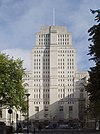Institute of English Studies
| Type | Graduate school |
|---|---|
| Established | 1999 |
Parent institution | School of Advanced Study, University of London |
| Location | , |
| Website | www |
The Institute of English Studies (abbreviated as IES) is a centre of excellence in the research, promotion and facilitation in the field English Literature and Language. With a specialisation in Book History, Palaeography and Textual Scholarship, the IES facilitates the advanced study and research of English Studies in the national and international academic community. The Institute, located in Senate House, London, is one of the ten institutes that together comprise the School of Advanced Study, University of London.
History
The Institute was founded as the Centre for English Studies in 1991.[1] Institute status was conferred by the University Council on 2 December 1998, and it officially became known as the Institute of English Studies on New Year's Day, 1999.[2]
Planned closure in 2014
In May 2014, London announced plans to close the Institute amidst a cut in funding to the SAS.[3]The work of the IES would have been then split between Institute of Historical Research and the Institute of Modern Languages Research[4]The proposal drew condemnation from academics, including members of the IES advisory board like Professors Robert Eaglestone and David McKitterick. McKitterick resigned as chairperson of the advisory board, saying the move would call into question '[London University's] academic commitment both to the subject and to wider responsibilities'.[5]A petition was launched by London University Vice-Chancellor Professor Sir Adrian Smith, with 3617 signatures. The planned closure was put on hold in late May; Roger Kain, dean and chief executive of the SAS, stated in a letter dated 23 May that 'concluded […] we need time to explore a wider range of options regarding the structure of SAS'. [6]
Networks
The Institute is partner in a number of important research networks and collaborations. In 2001 it helped establish the Centre for Manuscript and Print Studies, a collaboration between The British Library, St Bride Library, University of London Research Library Services (ULRLS), The English Department, University of Birmingham, School of English, University of Reading, Literature Department, Open University, The Shakespeare Institute, and The Centre for Textual Studies, De Montfort University. It also hosts and administers two prestigious and distinguished societies: The Bibliographical Society and The Malone Society.
Research
The Institute is a leading organisation in the research of English Literary Studies where it hosts and manages a variety of research projects such as: A History of Oxford University Press, the T. S. Eliot Editorial Project, the Virtual Museum of Writing, Revising the Canon of Elizabethan Drama, A Catalogue of English Literary Manuscripts, 1450–1700, an Old-Spelling Edition of the Works of John Ford and The Oxford Francis Bacon Project. Previous research projects have included the Reading Experience Database, DigCim: a Digital Catalogue of Illuminated Manuscripts (in collaboration with The British Library), "Between Two Worlds": Authors and Publishers 1870-1939 and The Irish Book in the Twentieth Century.
Publications
The Institute of English is home to the Yeats Annual, edited by Professor Warwick Gould, and published in association with Palgrave Macmillan.
Staff & Fellows
The intellectual and scholarly community of the Institute thrives due to the collaboration between IES Staff, Distinguished and Senior Research Fellows, Associate Fellows, Visiting Fellows and Students.
Among the Academic Staff at the Institute are:
- Warwick Gould (Director)
- Simon Eliot (Chair in History of the Book)
- Michelle Brown (Chair in Medieval Manuscripts)
- Wim Van Mierlo (Lecturer in Textual Scholarship and English Literature)
- Marcus Dahl (Lecturer in Authorship Studies)
Senior Research Fellows of the Institute include:
- Sir Brian Vickers
- Jerome McGann
- John Haffenden
- Ronald Schuchard
- Hans Walter Gabler
- Aamer Hussein
- Coral Howells
- Jane Roberts
- Ian Willison
- Sir Christopher Ricks
- W. J. McCormack
- Colin Smyth
- William St. Clair
- Henry Woudhuysen
- Peter Beal
- Anthony J. West
- Robin Alston
- R.F. Foster
- Sandra Clark
References
- ^ History of the Institute of English Studies
- ^ History of the Institute of English Studies
- ^ Guardian: University of London plan to close Institute of English Studies condemned
- ^ Guardian: University of London plan to close Institute of English Studies condemned
- ^ Guardian: University of London plan to close Institute of English Studies condemned
- ^ THS: Institute of English Studies planned closure put on hold

